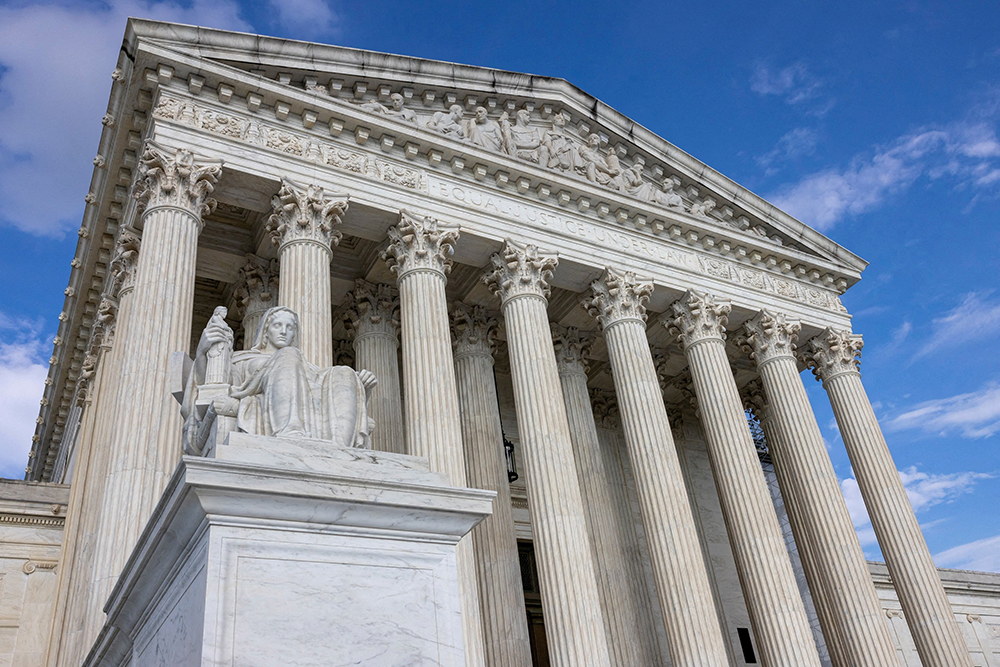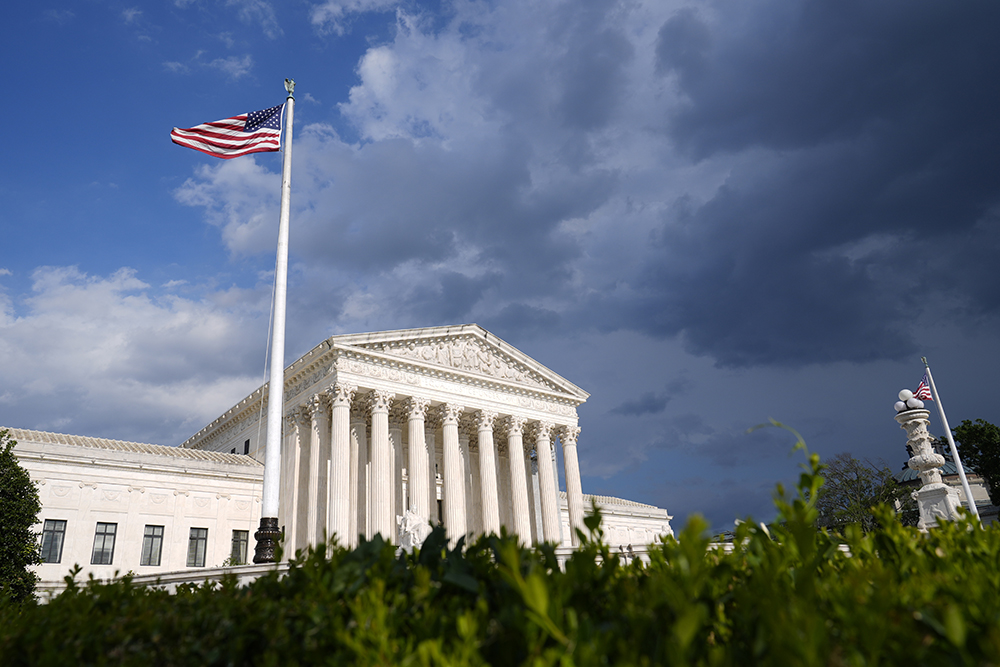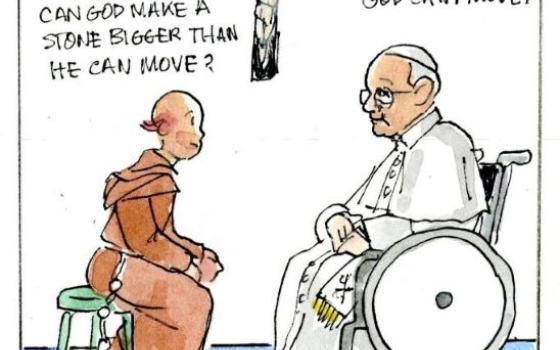
The Supreme Court is pictured in Washington June 29, 2024. (OSV News/Reuters/Kevin Mohatt)
President Donald Trump is dominating the headlines but another branch of government, the judiciary, decided to weigh in on a case that could reshape the separation of church and state. The Supreme Court agreed to hear arguments regarding public funding for an online Catholic charter school in Oklahoma, St. Isidore of Seville Catholic Virtual School.
The justices do not necessarily have to get into the church-state weeds in the case. They could conclude that the Oklahoma Supreme Court, which held the funding was unconstitutional under the Oklahoma state constitution, should not be contravened unless the decision is patently unconstitutional under the U.S. Constitution. It could note that, under Oklahoma law, the nature of charter schools as public-private ventures allows such funding, in the same way the federal government grants funding to Catholic Charities to perform certain societal tasks.
Nonetheless, this case could be a vehicle by which the Supreme Court continues its effort to recalibrate church-state jurisprudence in ways that are more friendly to religions and religiously motivated plaintiffs.
Advertisement
"It's a mistake to think of the United States as a 'Christian nation,' even though, of course, Christians and Christianity have, from the beginning, played important roles in American law and life," University of Notre Dame law professor Richard Garnett told me. "I have always argued that 'separation' of church and state in the American tradition was not supposed to mean French-style 'laïcité' or a 'naked public square,' or a 'no religious arguments in policy debates' rule. It means: (a) political and religious authority are 'differentiated,' (b) but differentiated things may 'cooperate' and (c) government may and should 'accommodate' religious believers."
No one is arguing that the Catholic Church should run a public school. But charter schools are privately run and publicly funded, so why should a religious organization that chooses to run one be forbidden from doing so? All sorts of people bring all sorts of ideas and beliefs with them into the public square. Why should religious ideas and beliefs be uniquely targeted for exclusion?
Many of us were raised in the long shadow of a series of U.S. Supreme Court cases that gradually banished religion from public schools and spaces. In 1940, Cantwell v. Connecticut started the ball rolling by applying the First Amendment's disestablishment clause to the states. In 1962, Engel v. Vitale barred school prayer and the next year Abington Township v. Schempp forbade Bible readings.
On the other hand, back in 1925, the Supreme Court struck down an Oregon law that forbid religious schools at all in Pierce v. Society of Sisters. In 1981, in Widmar v. Vincent the court held that a Bible study group could not be barred from using space in a public college for their meetings and religious services. And in the 1984 case Lynch v. Donnelly, the court allowed a crèche on public land as part of a Christmas display because it served the "secular purpose" of demonstrating the origins of the holiday.

The Supreme Court in Washington, June 30, 2024. (AP Photo/Susan Walsh, File)
Underlying all of these decisions was the idea that there was some objectively neutral status that could be achieved. There isn't. "The shift from differentiation to 'pushing religion out of the square' in the courts starts, I think, with the school prayer cases, where 'neutral' was transmuted into 'religion-free,' " says Garnett.
Whenever I think of claims to neutrality, be it in these discussions about the legal relationship of church and state or in claims about the free market, I am reminded of the late David Schindler's critique of Michael Novak's "theology of the corporation." Schindler, in his book Heart of the World, Center of the Church: Communio Ecclesiology, Liberalism, and Liberation, wrote, "Novak's position rigs the game: all the while it claims to be creating space or a market for competing moral visions, it is in fact, simultaneously, pouring the Scottish Enlightenment in this putatively 'empty' space or 'free' market."
In short, there are presuppositions and free principles in every position. Secularism can become a kind of religion, and it unavoidably makes ontological claims about human nature. It claims a Christian must leave our dogmas at the door, that the human person can be considered solely from his or her utilitarian significance, without any reference to transcendence. These were the thoughts that did not occur to the mid-20th century Supreme Court justices who thought the separation of church and state required the separation of religion and politics.
Garnett agrees with the recent changes in Supreme Court jurisprudence on church-state issues. The Supreme Court is stating that separation of church and state "does not require discrimination against religious beneficiaries (school choice) or the elimination of public religious symbols (the cross case, etc.) and expression."
Secularism can become a kind of religion, and it unavoidably makes ontological claims about human nature.
I am not a fan of charter schools. The idea that "competition" will improve education is fraught. Competition implies some will win and some will lose and no society can accept that some children should lose. And Christians should be concerned about any legal change that involves government entanglement with religious institutions. If St. Isidore gets these public monies, people will demand that it conform to public dictates. For example, should publicly funded institutions be exempt from partially non-discrimination laws as religious institutions currently are?
There is no neat and easy line to be drawn between church and state. Other countries, such as the United Kingdom and Canada, have drawn that line very differently from the way we do in the U.S. without any threat to religious liberty. The mid-20th century jurisprudence was inadequate, but some approaches to the issue could be worse.
We will see what the Supreme Court does in the Oklahoma case. Still, there is no reason for alarmism at the prospect of a public realm more open to religion and religious institutions. Caution, yes. Alarmism, no.







